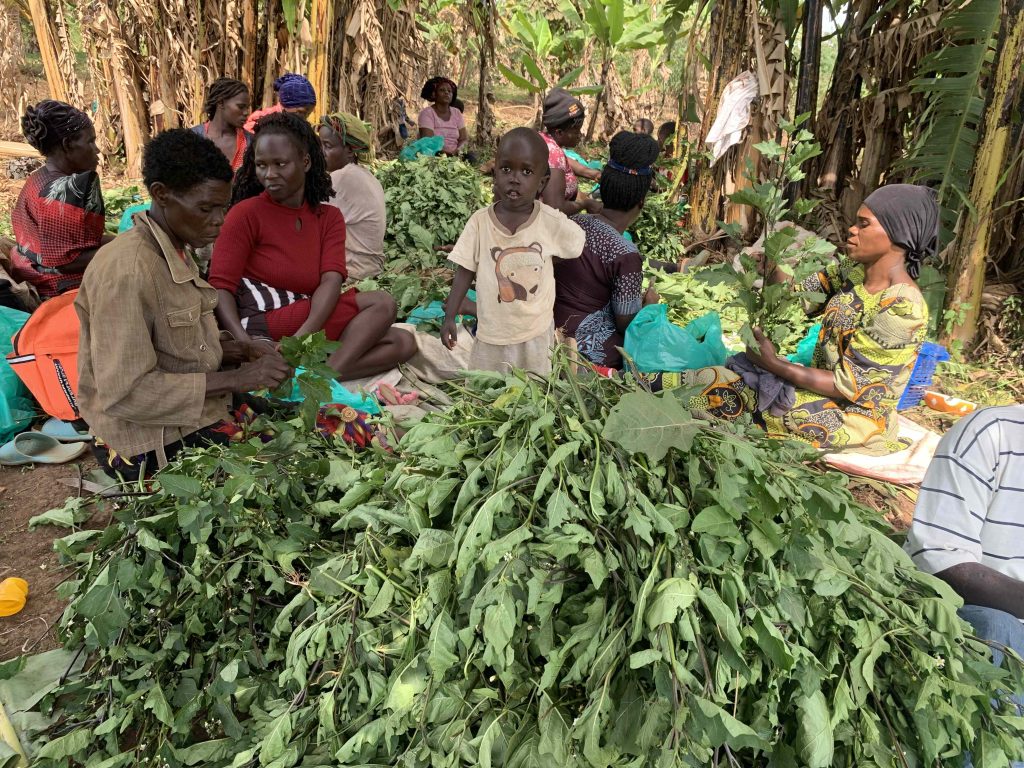By Eriah Lule
The grim faces, the chit chanting, and the ululation in the compound of Matilda Naava, who harbors the Local Council One office in her garage was at the peak as they saw a Toyota Premio entering the gate.
Yes, it’s the car that carried fresh vegetables from Uganda Christian University’s (UCU) agriculture farm in Ntawo. It was Matilda’s compound that acted as the collection point for vegetables for these aged citizens.
The Faculty of Agricultural Sciences, in collaboration with the School of Medicine and Dentistry, is running a project entitled, “Exploiting the potential of African Indigenous Vegetables for human health in Uganda” This is a project being led by Prof. Elizabeth Kizito and Dr. Gerald Tumusiime. The project is aimed at studying the effects of consuming indigenous vegetables on human health.
Buteme, a lecturer at the faculty of Agricultural sciences and the agronomist on the project, said that as part of the project, African eggplant, also known as Nakati, has been grown on 2.5acres of land using organic methods.
These vegetables are harvested, weighed, packed, tagged and distributed to 106 participants within Mukono central division three times a week. The participants’ baseline anthropometric and biochemical profiles were collected before distribution, and an end-line assessment is to be done to assess the change.

Ruth further noted that the study is being conducted because little is known about the exact effect of consumption of our African indigenous vegetables (AIVs) on human health. All we know is that this says or results from exotic vegetables.
There are also no dietary guidelines for our AIVs. Moreover, a large population of our elderly community (50 years and older) suffers from non-communicable diseases (NCDs) like diabetes and high blood pressure, which can be managed with diet. The project hopes that the results of this study will provide recommendations on the use of AIVs in the management of NCDs in the elderly.
Matilda Naava, aged 82, a resident of Kigunga village in Mukono Municipality, couldn’t stop thanking the Faculty for its tremendous work and effort it has carried on to support the elderly through this project.
“I rarely sweat, but when I take these vegetables, they act as a stimulant for my body,” she said. “I can sweat and feel relieved, and actually after I feel like I have life again.”
The vegetables were well measured straight from the farm in green polythene. A small excess was also packed in a white polythene bag for the family members.
Mirembe Agnes, a resident of Kigunga Village in Mukono Municipality aged 50 years, noted that the faculty taught them the use of these vegetables in their lives and how they are going to help improve their health.
“We were first taught the importance of these vegetables and how they can be very useful to our lives as grown citizens. They also further taught us how to prepare them so that they don’t lose any food value in the process,” Mirembe said.
Migamba Oboth, aged 52, noted that the vegetables don’t only give them energy but surplus food given the high cost of living these days.
“These days it’s hard to cook food and also put some‘veggies’ because they are very expensive. Now UCU comes and gives them to us for free just to boost our health. We don’t only improve health but also have surplus food for ourselves,” said Oboth.
David Isooba, the field technician of this project, says that the project aims to enhance our elderly community’s health through food to boost their immune systems. He says, “We have already started getting feedback of how these vegetables have been of great importance in their lives.”
“We want to enhance our elderly community’s health through food to boost their immune systems. We have already started getting feedback of how these vegetables have been of great importance in their lives,” he said.
On the other hand, the project doesn’t only enhance the elderly’s lives but also improves the community’s way of life for the people working at the farm as well as the people that receive them, as the Chairman LC 1 articulates. as articulated in the video.


